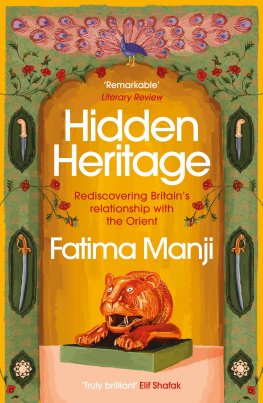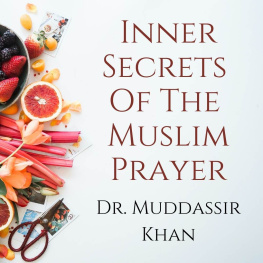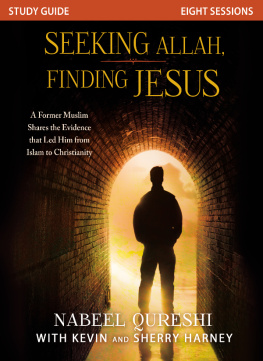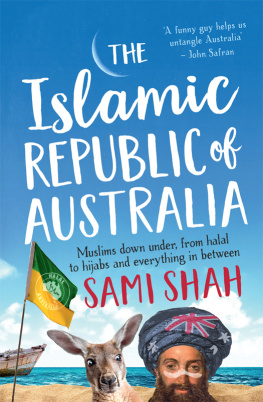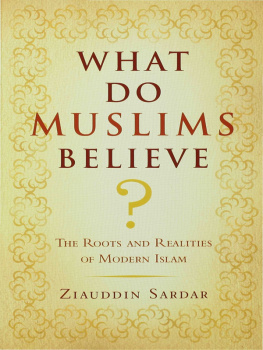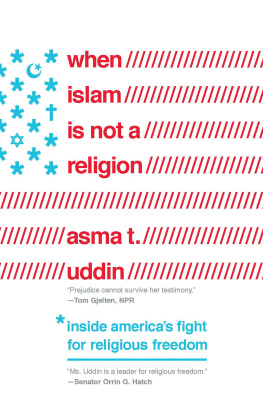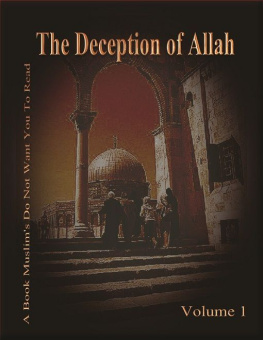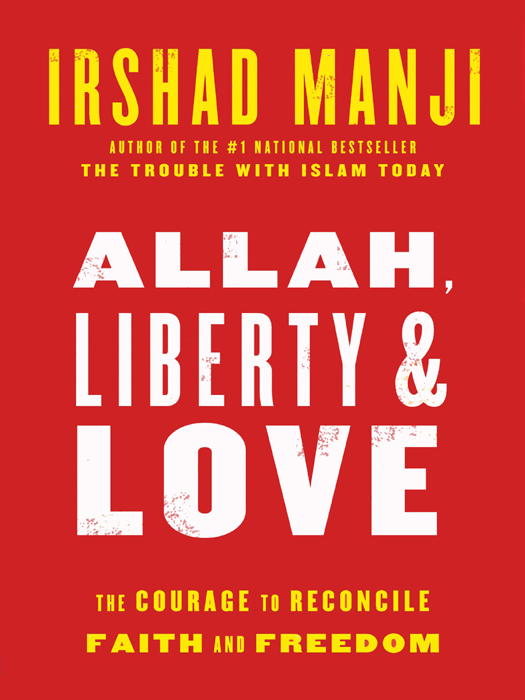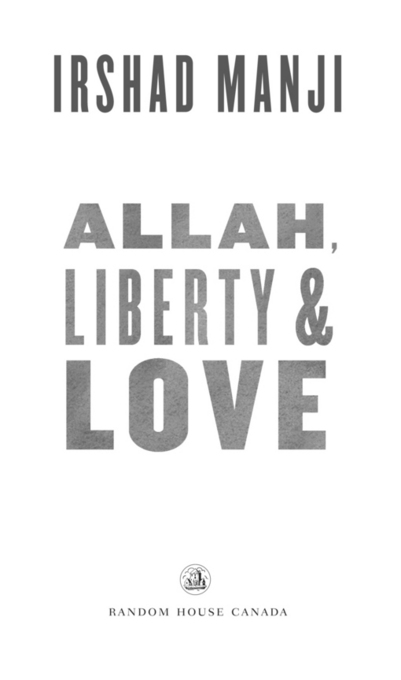PUBLISHED BY RANDOM HOUSE CANADA
Copyright 2011 Irshad Manji
All rights reserved under International and Pan-American Copyright Conventions. No part of this book may be reproduced in any form or by any electronic or mechanical means, including information storage and retrieval systems, without permission in writing from the publisher, except by a reviewer, who may quote brief passages in a review. Published in 2011 by Random House Canada, a division of Random House of Canada Limited, Toronto, and simultaneously in the United States of America by Free Press, a division of Simon & Schuster, New York. Distributed in Canada by Random House of Canada Limited.
www.randomhouse.ca
Random House Canada and colophon are registered trademarks.
Library and Archives Canada Cataloguing in Publication
Manji, Irshad
Allah, liberty & love : the courage to reconcile faith and freedom /
Irshad Manji.
eISBN: 978-0-307-35810-3
1. DemocracyReligious aspectsIslam. 2. LibertyReligious aspectsIslam. 3. Islam and politics. 4. MuslimsConduct of life.
I. Title.
BP 190.5. D 45 M 35 2011 297.562 C 2011-901635-4
Cover design by Kelly Hill
v3.1
In memory of my grandmother, Leila Liberty
CONTENTS
TWO Identity Can Trap You,
But Integrity Will Set You Free
SIX In Time of Moral Crisis,
Moderation Is a Cop-Out
AUTHORS NOTE
Allah is the Arabic name for Godthe universally shared God of liberty and love. Not exactly the perception that many people have of Allah, I realize. But as Ill strive to show, God loves me enough to give me choices and the liberty to make them. In turn, I am to love Gods other children enough to have faith in their ability to make choices. Love, then, obliges me to do two things at once: champion freedom for more than just myself and challenge power-mongers who steal choices from you and me. In these topsy-turvy times, the link between liberty and love has to be explored with clarity. As Ill show, my ebullient relationship with Allah helps me do that.
Clarity requires reason, which invariably leads to the question How can you know God exists? I cant know. I believe. I acknowledge this upfront so as not to insult the intelligence of agnostic and atheist readers. Still, Ill also show that the best way to respect everybodys intelligence is by having faith in our potential to become agents of change in this life rather than sit on our hands in fatalistic anticipation of some hereafter. Through my faith in the creative capacity of individuals, I hope to speak respectfully to nonbelievers as much as to believers.
In fact, individuals of various creeds have shaped my thinking, so let me say a few words about sources. Over the past decade, among the most high-impact teachers Ive had are the Muslims and non-Muslims who engaged with me directlywhether at events, on Facebook or by email. With deep gratitude, Ive woven a lot of them into this book. In the main, Ive cited only first names or none at all. And when Ive been aware of danger to my correspondents, Ive changed their names.
So much additional research has gone into Allah, Liberty & Love that printing the footnotes would add an absurd number of pages. To make the book readable and affordable, as well as to avoid killing more trees, Ive posted all the footnotes on my website, irshadmanji.com. I also use the footnotes to flesh out a number of my points. Please visit this section of my site if youre curious to learn more about anything youve just read.
Finally, at the back of the book, I provide a list of recommended readingssome of which still blow my mind. May they inspire as much as inform you.
INTRODUCTION
From Anger to Aspiration
On a chilly afternoon in February 2007, I arrived in Texas for the first time ever. Houstons Rice University had invited me to speak about my book The Trouble with Islam Today: A Wake-Up Call for Honesty and Change. En route to the interfaith center, my host and I discussed (what else?) science. We marveled at the theory that physicists have come up with to explore a world beyond the material, and we exulted in the fact that superstring theory, like a spiritual quest marinated in mystery, has its doubters as well as its defenders. A short while later, in a state-of-the-art auditorium named for Shell Oil, I stood before rows of people who reflected a Bible Belt throbbing with diversity: Muslims, Christians, Jews, Buddhists, polytheists, atheists andLord love us allmisfits.
Jazzed by what he witnessed, my host pushed the envelope of diversity and introduced me as the Muslim to whom Oprah Winfrey, an African-American, had given her Chutzpah Awardchutzpah being the Yiddish word for courage bordering on craziness. The audience laughed. Timidly. Everyone could feel the apprehension. Writing about the need for change in Islam doesnt win you points for diplomacy, not even in Texas. I consider myself a truth-teller, but many in the crowd feared a flame-thrower.
Im here to have a conversation, I assured thema conversation about a very different story of Islam. We all knew the Islam that jumped out of our headlines: an unholy trinity of bombings, beheadings and blood. We also knew that, according to moderate Muslims, Islam means peace. Anybody could have given this audience more of the same, but thats never been my mission. The story I would tell, I promised, revolves around a really big idea that I believe has the capacity to change the world for good.
That idea is ijtihadIslams own tradition of dissenting, reasoning and reinterpreting. For non-Muslims in my audience, I pronounced it carefully: ij-tee-had. It comes from the same root as jihad, to struggle, but unlike violent struggle, ijtihad is about struggling to understand our world by using our minds. Which implies exercising the freedom to ask questionssometimes uncomfortable ones. I spoke about why all of us, Muslim and not, need ijtihad. Burning a hole in my back pocket was an email from Jim, one of my American readers. The message of ijtihad, of questioning, speaks to more than just Muslims, he enthused. Throw away the confines of political correctness and discuss, debate, challenge and learn. A brown Muslim woman inspiring a white Christian man. Isnt freedom great?
I was about to be reminded just how great freedom is. The evening saw its share of questions for me: What about the ills of the West? Will it be women who kick-start reform in Islam? How do you use ijtihad to beat the terrorists? At the end of the night a Muslim student quietly made his way over and told me that only when he attended university in the United States did he hear about ijtihad. Why, he wondered, arent we taught about this Islamic tradition in our madrassas? I directed him to the part of my book in which I addressed his question. He thanked me and turned away. In mid-motion, the young Muslim stopped to ask me another question: How do I get your chutzpah?
Over the past eight years, Ive had hundreds of conversations like this. Theyve taken me on a surreal journey thats culminated in the book youre holding now. Let me back up.
On the morning of September 11, 2001, I was in my first meeting as the executive producer of a TV channel dedicated to spirituality. I had no idea about the World Trade Center attacks until the meeting wrapped up and I returned to an office of stunned colleagues hunched over TV sets. Soon after, I wrote a newspaper editorial about why we Muslims can no longer point fingers at non-Muslims to explain away our dysfunction. For too long wed broken faith with chapter 13, verse 11 of the Quran: God does not change the condition of a people until they change what is inside themselves. Its a 13:11 solution to a 9/11 abomination.


